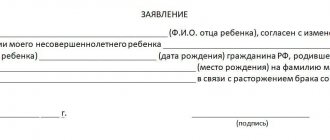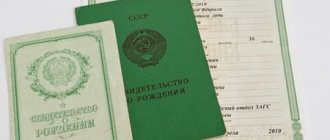Changing the surname and patronymic of a minor child
Family life is not as simple as it seemed even before the wedding; you will have to put up with everyday and financial difficulties and raise children together. Not all spouses can stand this and some couples separate. Husbands and wives often have questions about who their young children will stay with and how to change their child’s last and patronymic names. From our article you will learn how, within the framework of the current legislation of the Russian Federation, you can change the personal data of minor children, what situations occur during this procedure, and how to act correctly in them. You can change your baby’s last name even without the father’s permission, you just need to follow the legal route.
Replacement of passport due to change of patronymic
In the Russian Federation, citizens receive their first passport at the age of 14. If a child 14-18 years old has a need to change his middle name, then, in addition to a new birth certificate, he will also have to change his passport.
If personal data changes, the passport loses its relevance, which means it must be exchanged. To replace, you need to contact the territorial division of the Ministry of Internal Affairs or the MFC. You need to have a list of documents with you:
- Application for replacement of passport;
- Passport of a citizen of the Russian Federation;
- Birth certificate;
- Certificate of change of patronymic;
- Two photos;
- Receipt for payment of duty.
After changing the patronymic name of a minor, you will need to notify the educational institution, clubs, sections, clinic and other institutions that the child attends. This is necessary to ensure that there are no misunderstandings in the future, especially when filling out documents with the child’s data.
Father's consent to change the child's surname
It is not easy to change the surname of a joint child after the divorce of the parents, if the father or mother is against it. With the consent of both parties, this procedure is much simpler and faster, but even this does not negate the completion of some basic stages.
Father's permission sample
First of all, the applicant should draw up a written consent on his own behalf, and obtain the same document from his husband or wife. If one of the spouses is responsible for all questions about changing the child’s personal data, the application received from the other party must be certified by a notary.
Then you need to contact the guardianship and trusteeship authorities (TSA) for permission. Since you are going to change the data of a minor child, you cannot do without the permission of the guardianship service, even if both parents give their consent. The POiP will check whether the rights of young children are being violated, and only after that you will receive permission.
When contacting a government agency, you need to provide the following documents:
- Passports of both parents.
- Child's birth certificate.
- Document on divorce.
- Application from spouses to change the baby’s personal data.
- The child’s consent in writing if he is over 10 years old.
- A new marriage certificate if the child’s mother remarried.
The guardianship and trusteeship authorities review the submitted documents within 30 days and make a decision whether to issue a permit or refuse. Such a decision will be provided to the applicant spouse in the form of an order or instruction. Also, the response time from the guardianship service directly depends on the region of residence of the spouses.
Change of patronymic
Changing the patronymic is much less common in legal practice than changing the surname or first name. This procedure is possible in three cases:
- When the father changes his name;
- When adopting a child;
- When establishing paternity.
Let's consider each situation separately.
By law, any citizen over the age of 14 has the right to change his name. It is not uncommon for adults to change their names. A change in personal data by the father entails changes to a number of legal documents. One of such documents is the birth certificate of the children of a citizen who has changed his name. To do this, you will need to contact the registry office and make changes to the child’s birth certificate and obtain a birth certificate for the baby with a new middle name.
Adoption involves the establishment between the child and the adoptive parent of the same form of legal relationship that exists between natural children and parents. After completing the adoption procedure, the adoptive parents are issued an adoption certificate, on the basis of which changes are made to the child’s birth certificate. And then a new birth certificate is issued, which contains information about the new parents. In this regard, the child's middle name changes.
Paternity is established in court. Until this point, the child’s birth certificate could contain information about another man as the baby’s father or information recorded from the mother’s words. If a man who considers himself the biological father proves in court that he is related to the baby and this fact is recognized by the court, then the child’s middle name is changed based on a court decision.
There are no other legal grounds for changing the middle name of a minor. Therefore, the mother cannot voluntarily carry out this procedure, no matter how much she wants it.
How to change a child's last name if the father does not agree
With the consent of both parents, changing the baby’s personal data occurs without problems. But if the father is against it, the procedure may be significantly delayed. To change a child's last name, the mother gives a compelling reason why the child should not be in the father's last name. The algorithm of actions is specified in Articles 58-63 of Federal Law No. 143.
The procedure for changing a surname is as follows:
- The mother submits an application to the guardianship and trusteeship authorities. In the document, indicate the reason why the child should not bear the father’s surname. If the father is against it, his opinion will be heard at the guardianship and trusteeship service, and then the authorized body makes a decision.
- If the guardianship decision is made in favor of the mother, she receives an order and applies to the registry office with these documents. In addition to the order, you also need to provide your passport and the child’s old birth certificate.
How to change?
Changing personal data (in particular, patronymic) by a person under 14 years of age is possible only with the official consent of the blood parents (trustees or persons who adopted the child).
Where to contact?
The first step to carry out this procedure will consist of providing certain documentation to the guardianship authority. Representatives of this structure carefully consider the current situation and give approval if they see the minor’s interest in this issue.
If the trustee body suddenly discovers obstructive details, the procedure will be suspended until the circumstances are clarified.
Most often, the case is delayed when the parent does not give his consent to change the initials. Such an obstacle may prompt a review of the circumstances.
The period for consideration of an application by a government agency can take from 1 to 3 months. If the guardianship authorities refuse, then the law allows the applicant to apply to a judicial institution with a request to change the decision of the guardianship authority.
Upon receipt of approval from the guardianship authority, you must register the amended birth document in the registry office. Certain documents must also be attached.
You should contact the registry office at the child’s place of residence or the authority where the newborn was registered. In recent years, you can also contact the MFC if necessary (there are many positive reviews about this structure).
The issuance of a new certificate with personal data changed in fact requires payment of a state fee in 2021 (its amount is exactly 650 rubles).
What documents exactly are needed?
Considering the fact that in each case different circumstances are considered that prompt a change of patronymic, the package of official papers for the trustee body is collected differently.
Typically, the guardianship authorities ask the applicant to provide them with:
- a statement of a firm desire to change the child’s existing middle name;
- documents confirming the identity of each parent;
- a certain document issued by the housing office;
- a document that can confirm the fact that the divorce has taken place;
- adoption certificate;
- consent of the blood father (or official adoptive parent), certified by a notary.
Submitting documents to the registry office involves submitting a standard set of papers; you will need:
- a statement on the need to make amendments to the special register of acts of official civil status;
- permission from the special guardianship authority to register a new middle name;
- payment slip confirming payment of state duty.
Expert opinion
Maria Lokshina
Family law expert since 2010
An important difference in the procedure for changing patronymics upon reaching 14 years of age is the absence of the requirement to obtain approval from the guardianship authority. In this case, the consent of the blood father, if he is alive and not deprived of parenthood rights, will be required.
The list of required documentation to be submitted to the registry office is similar to the list requested when the child is under 14 years of age.
How does one obtain a new certificate?
To obtain a new official birth certificate from the registry office, you will need to attach an application to the list of documents described above, which will reflect:
- initials of the applicant (child);
- information about time and place of birth;
- citizenship of the Russian Federation;
- reasons that prompted the change of initials;
- new middle name;
- number of the certificate issued by the registry office earlier.
When submitting an application, you must provide the original original certificate confirming the birth of the child and his passport.
How to change the middle name of a child under 14 years old
In some cases, after a divorce, a woman wants to change not only her surname, but also her patronymic.
This is only possible under the following circumstances:
- The mother remarried and the child was officially adopted by the new father.
- The natural father has been deprived of parental rights.
- There is a dash in the “patronymic” column on the birth certificate.
- The husband challenged his paternity.
- Information about the natural father is included in the certificate only from the words of the mother.
To change the child’s middle name, the mother must contact the guardianship authorities, and permission from both parents will be required.
But there are cases when you can change your middle name without the consent of the other party:
- The spouse is officially declared incompetent.
- The father or mother has been deprived of parental rights by court.
- It has been proven that the father does not take part in raising a common child.
To prove all of the above cases, supporting documents will be required.
Procedure for changing patronymics
To change the patronymic, the child must contact the registry office at the place of residence or the registry office of the locality where the birth was registered. Changes are made with the consent of both parents or by court decision.
Application for change of patronymic
Change of personal data is carried out on the basis of an application for a change of patronymic. Its form was approved by Resolution No. 1274 of October 31, 1998.
The application contains the following information:
- Name of the civil registry office;
- Full name of the applicant;
- Request to change patronymic;
- Information about the citizen who is changing his patronymic (full name, date, place of birth, citizenship, nationality, birth registration number, etc.);
- Reason for changing patronymic;
- Location;
- Details of the identity document;
- Attachments to the application;
- Date, signature.
The application is reviewed within a month. The review period may be extended if the registry office has not received copies of the vital records, but not more than for two months.
The civil registry office may refuse to change a citizen's patronymic name. In this case, the decision to refuse is made in writing. The refusal must be justified and its reason must be indicated.
If the decision is positive, a certificate of change of patronymic is issued. Then changes are made to the vital record and a new birth certificate is issued.
Changing the surname and patronymic of a daughter or son after 14 years of age
According to the current legislation of the Russian Federation, when a child has reached the age of 14, he has the right to make some decisions on his own, but all responsibility still lies with his parents. This right is spelled out in Art. 59 of the Family Code of the Russian Federation. If a teenager has expressed a desire to change his last name, but his parents are against such a decision, this will be a significant obstacle. The same as in the case when parents demand a change of surname or patronymic, but the child is against it. Only the court has the right to resolve such controversial issues.
With parental permission
If a teenager wants to change his personal data and his parents are not against such a decision, he must submit an application and written consent from both parents to the registry office at his place of residence.
If the child is already 14 years old, permission from the guardianship and trusteeship service is not required.
Changing a child's middle name
The law provides for changing the child's middle name only if the father's name changes.
My husband and I are divorced, there is consent from the father to change the last name, first name and patronymic. The guardianship and trusteeship authorities gave us permission to change the child’s first and last name, which we did. And the change of patronymic (although there is a notarized permission from the father) was refused. The middle name is unpronounceable. The child is 1.5 years old, she has not seen and does not know her father, the child support case is with the bailiffs. Milena.
Hello Milena!
I have to disappoint you, but the guardianship and trusteeship authority rightfully refused to change your child’s middle name.
Indeed, in accordance with Part 1 of Art. 59 of the Family Code of the Russian Federation, if there is a joint request of the parents before the child reaches the age of fourteen, the guardianship and trusteeship authority, based on the interests of the child, has the right to allow the child to change the name, as well as change the surname assigned to him to the surname of the other parent.
As for changing the patronymic, it is allowed only when the father's name is changed.
Before a child reaches the age of 14, it is not possible to change his middle name, even if his father agrees to this.
This follows from the provisions contained in Part 1 of Art. 58 of Federal Law No. 143-FZ “On Acts of Civil Status”: a person who has reached the age of fourteen years has the right to change his name, which includes the surname, first name and (or) patronymic.
Thus, until the child reaches the age of 14, this issue will have to wait. The fact that the child has not seen and does not know the father has no legal significance in this case.
| Kuznetsov Evgeniy Alekseevich Attorney at the Moscow Bar Association |
Do you have an opinion, a question, or need legal advice on the topic of this publication?
Write in the comments!
Briefly state the circumstances in connection with which you want to receive advice from a lawyer and ask your question. Please note that you will not be able to receive a full consultation with a detailed explanation of all possible ways to solve the problem in this way, because its preparation requires the time necessary to correlate a particular situation with the norms of the current legislation governing it, and the lawyer is busy enough to answer all incoming questions to the extent that the applicant would like. Please also note that Evgeniy Alekseevich gives answers to questions at his own discretion, and they are aimed at informing in general terms what to do in a given situation. A detailed study of situations that are complex in their content is impossible in this format. And in order to be guaranteed to receive a detailed, motivated answer to all your questions with a detailed study of the circumstances of your case/situation, take advantage of a full consultation with a lawyer.
Sign up for a consultation ›› Receive a consultation by e-mail ››
Situations when the father’s consent is not necessary to change a child’s surname
All circumstances in connection with which an interested party can change a child’s surname without the consent of the father are regulated by Article 59 of the Family Code of the Russian Federation. Changing a child's surname without the consent of the father can be carried out in the following cases:
- The current location of the minor's father cannot be determined.
- The parent's consent is not required if he or she has been deprived of parental rights.
- If the father of a minor child is officially declared incompetent (meaning incapacity caused by psychiatric disorders).
- The consent of the parent is not required if he evades in every possible way the fulfillment of parental responsibilities regarding the upbringing and financial support of the child. It should be noted that it is much easier to prove a parent’s evasion of material responsibilities for supporting a child than evasion of participation in the upbringing of a joint offspring.
- The father's consent is not required if the child was born outside of an officially registered marriage. In this case, the mother's surname is indicated on the child's birth certificate.
How to change a child's middle name and last name
To change personal data, the applicant must contact the district registry office.
In accordance with the law, you can contact the following departments:
- at the place of permanent or temporary registration of the applicant;
- at the place of registration of birth of the minor.
The citizen provides the authorized body with the necessary documents, on the basis of which the application is filled out.
The form can be obtained from a specialist in the regional registry office; there is no point in filling out the document yourself in advance. The registry office will still ask you to rewrite the application according to their rules.









